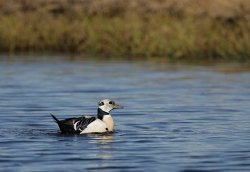In August 2009, the U.S. Fish and Wildlife Service (USFWS) released a report identifying the priority research, modeling, and synthesis activities needed to predict climate-related impacts to fish and wildlife populations in the U.S. Arctic. The report builds on the findings from a November 2008 USFWS workshop, Wildlife Response to Environmental Arctic Change: Predicting Future Habitats of Arctic Alaska, held in Fairbanks, Alaska.

A male Steller's eider (Polysticta stelleri) near Barrow; the species is listed as threatened under the Endangered Species Act. Photo by Ted Swem, USFWS.
The workshop was attended by over 100 participants representing federal and state agencies, academia, and commercial and nonprofit organizations interested in advancing understanding of the effects of climate change on birds, fish, and mammals of arctic Alaska. Focusing on terrestrial and freshwater systems, working groups used a conceptual modeling approach to identify the potential changes that would most strongly influence habitat suitability for a broad suite of arctic species.
The working groups emphasized that predictions of climate effects on fish and wildlife populations must be tentative, given the uncertainty surrounding climate forecasts and unavailability of models coupling climate, geophysical, and ecological processes at appropriate spatial and temporal scales. They also agreed that to predict climate change effects on species and habitats more accurately, multidisciplinary work is needed to improve understanding of underlying biological and physical processes that drive terrestrial and aquatic ecosystem function and the response of those systems to climate change. Hydrologic processes, in particular, are pivotal determinants of climate-related habitat change, and enhanced data collection and modeling in this area will benefit multiple users.
All participants emphasized that information available on life history, habitat requirements, distribution, abundance, and demography is inadequate for many arctic species. Basic biological studies, therefore, are also needed. Focal species should be chosen based on predicted vulnerability to climate change and potential to serve as indicators of hypothesized habitat changes.
USFWS Climate Change Planning
The Fish and Wildlife Service recently released a draft Climate Change Strategic Plan for public comment as part of developing an overarching Department of the Interior (DOI) framework to coordinate DOI climate change science and resource management strategies.
The USFWS plan, which is available for comment until 23 November, outlines commitments intended to enable USFWS to play a leading role in addressing the challenges of a changing climate system. These include building Landscape Conservation Cooperatives (LCC)—conservation science partnerships between federal agencies, states, tribes, and other entities within a defined geographical area that work together to develop regional and field technical capacity and provide spatially explicit, scientifically based analyses and tools to address climate change and other limiting factors at a landscape level. Guided by DOI's newly created Climate Response Council, the LCC will be closely integrated with the U.S. Geological Survey National Climate Change and Wildlife Science Center and its Regional Climate Change Response Centers; these will provide climate science information and data and work with LCC to develop modeling and decision support tools and conduct site-specific studies of climate impacts and species and habitat responses.
In the coming year, the USFWS Alaska Region, with its partners, plans to establish the Northern Alaska Landscape Conservation Cooperative office in Fairbanks to continue collaborative efforts initiated in 2009 to identify critical information needs in the Arctic.
For more information on:
The workshop, see www.arcus.org/alaskafws/, or contact Philip Martin (Philip_Martin [at] fws.gov, 907-456-0325);
The draft strategic plan, see www.fws.gov/home/climatechange/, or contact Charla Sterne (charla_sterne [at] fws.gov, 907-786-3471).
